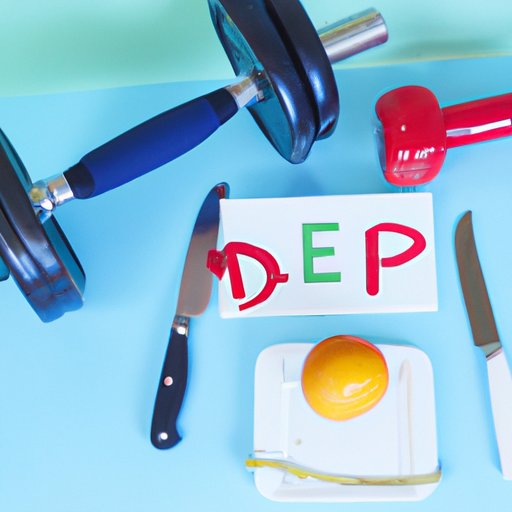
I. Introduction
For athletes who compete in weight-class sports, cutting weight before a competition is a common practice. Unfortunately, many athletes resort to unsafe techniques that can result in dehydration, muscle loss, and even hospitalization. In this article, we will explore the science behind safe and effective weight cutting, and provide tips and strategies for athletes looking to cut weight safely and without sacrificing performance.
II. 10 Tips for Cutting Weight Safely and Effectively
1. Set Realistic Goals: Begin by setting achievable weight goals. Aim to lose no more than 1-2% of your bodyweight per week.
2. Stay Hydrated: Avoid dehydration by drinking plenty of water and keeping an eye on your urine color. Clear, pale urine typically indicates adequate hydration.
3. Consult with a Professional: Seek the advice of a sports nutritionist and/or strength coach with experience in weight-cutting.
4. Monitor Your Weight: Regularly weigh yourself to ensure you are on track to meet your goals.
5. Keep Nutrient Intake High: Cut calories from carbohydrates and fats, not protein and other vital nutrients.
6. Use Sauna or Steam Room Cautiously: Avoid prolonged exposure and make sure to stay hydrated before and after using a sauna or steam room.
7. Gradually Decrease Caloric Intake: As you approach your competition, gradually cut calories over the course of several days instead of drastic fasting or sweating methods.
8. Don’t Overdo It: Losing too much weight can negatively impact performance and health.
9. Avoid Alcohol and Caffeine: Both can have dehydrating effects and should be avoided during the weight-cutting process.
10. Pay Attention to Mental Health: Cutting weight can be stressful and mentally taxing. Make sure to prioritize mental and emotional well-being during the process.
III. The Science Behind Cutting Weight: A Guide to Doing it Right
Effective weight cutting should be based on science, not guesswork. The process involves manipulating body water and glycogen stores through diet and exercise.
Dehydration has a significant impact on weight, as it can result in a loss of water weight and glycogen stores. However, dehydration should be done with caution, as it can lead to negative effects such as headache, fatigue, and even organ failure.
Carbohydrate manipulation involves reducing carbohydrate intake to deplete glycogen stores, which can lead to significant weight loss. However, this approach should also be done with caution, as glycogen stores are a necessary fuel source for athletes during competition.
To create a personalized weight-cutting plan, it is recommended to seek the advice of a sports nutritionist and/or strength coach.
IV. From Water Loading to Carb Cycling: How to Cut Weight Without Losing Performance
There are various weight-cutting methods that athletes can use to maintain optimal performance while cutting weight.
Water loading involves increasing water intake leading up to the competition, which can trick the body into releasing excess water weight.
Carb cycling involves alternating high and low carbohydrate intake, which can help to deplete glycogen stores while still allowing athletes to maintain muscle mass.
Other methods include sodium manipulation, fasting, and sweating. While these methods can result in significant weight loss, they should be used with caution and only under the guidance of a professional.
V. The Ultimate Guide to Safe Weight Cutting for Athletes
Safe and effective weight cutting involves more than just manipulating diet and exercise. Athletes should also prioritize adequate sleep, stress management, and mental and emotional health.
A healthy weight cutting plan should prioritize nutrient-dense foods and adequate protein intake, while also allowing for flexibility and enjoyment in food choices.
It is also important to maintain physical activity during the weight-cutting process, while also allowing for adequate rest and recovery time.
VI. Step-by-Step: How to Cut Weight for Your Next Competition
1. Set Realistic Goals: Begin by setting a realistic weight goal and timeline for achieving it.
2. Consult with a Professional: Seek the advice of a sports nutritionist and/or strength coach to create a personalized weight-cutting plan.
3. Monitor Your Weight: Regularly weigh yourself to ensure you are on track to meet your goals.
4. Gradually Decrease Caloric Intake: As you approach your competition, gradually cut calories over the course of several days instead of drastic fasting or sweating methods.
5. Stay Hydrated: Drink plenty of water and avoid caffeine and alcohol.
6. Utilize Weight-Cutting Techniques: Consider using water loading and carb cycling under the guidance of a professional.
7. Prioritize Mental Health: Manage stress and prioritize adequate sleep and mental and emotional well-being throughout the weight-cutting process.
8. Final Weigh-In: Weigh in at the competition and refuel with nutrient-dense foods and fluids to prepare for optimal performance.
VII. Expert Advice on Cutting Weight: Tips, Tricks, and Precautions
Experts in the field recommend prioritizing safe and healthy weight cutting methods that do not sacrifice performance or health.
Common myths and misconceptions regarding weight cutting include the belief that cutting weight is necessary for optimal performance or that drastic weight loss will result in significant gains.
The most effective and sustainable approach to weight cutting involves a balanced approach to diet, exercise, and overall health that prioritizes safe and personalized methods.
VIII. Conclusion
Effective weight cutting is a crucial part of many weight-class sports, but it is important to approach it in a safe and effective manner. By following the tips and strategies outlined in this article, athletes can cut weight without sacrificing performance or health. Remember to consult with a professional, prioritize mental and emotional well-being, and never sacrifice health for short-term weight loss.





